Contents
In a previous blog article published in May 2020, we have explained in detail about the importance of an invoice and what are important details that must be included in your invoice. An invoice is an important document that provides information to your customers so they know how much they are expected to pay, and by when. How you communicate this information to them is by including your payment terms and conditions in your invoice.
What is a payment term?
Payment terms are terms and conditions that you include in your invoice to inform your customers of how much and by when you are expecting payment from them. It is an important part of your invoice which your customers will refer to for payment preparation.
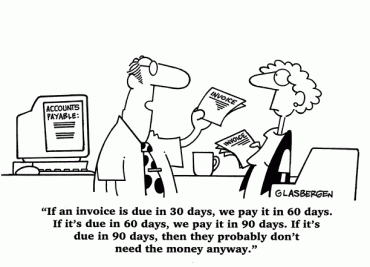
Why are payment terms important?
Since the payment terms provide your customers information about the expected payment amount and due date, it helps them to plan their payment cycle and manage their cash flow better, especially when your customers are also businesses. Not every transaction is paid in full and in cash, and not every transaction is given a 30-day due date; so providing clear payment terms and conditions will help customers to adjust their payment schedule and manage their budget.
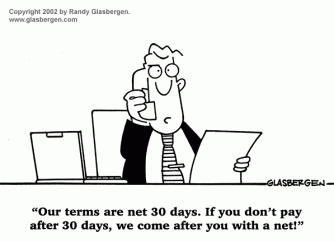
Stating clear payment terms on your invoice also helps your own business to manage your cash flow to ensure you always have cash on hand even though you are giving out 30-day payment terms. Poor management of customers’ payment can result in a collapse of your business when you find out you have insufficient operating expenses but you will only receive customers’ payments in the next few months.
Apart from the above, setting clear payment terms also helps your business to get paid on time, or even earlier! Interested to know how? Read on to find out.
Top 10 payment terms you should know in Malaysia
There are many invoice payment terms that you can set for your own business. After all, you are your own boss, you own your business, so it is up to you how you want to be paid! Here is a list of the top 10 payment terms being used in Malaysia:
1. Cash
A cash payment term indicates that payment is only accepted in cash, with no credit extended to your customers.
2.Cash on Delivery (COD)
COD requires your customers to pay cash once the goods they ordered are delivered to them. This means that customers will have to get the cash ready on the day of delivery in order to receive the ordered goods.
3. Cash in Advance (CIA)
Having a CIA payment term tells your customers that they need to pay cash before the goods are delivered to them.
4. Payment in Advance (PIA)
Similar to CIA, a PIA also informs your customers that they need to make payment before the goods are delivered to them or services are provided. The difference is that this payment may be in the form of credit, and not restricted to cash only.
5. Net 7/14/30/60/90
This is the most popular invoice payment term, which indicates that net payment is due X days after date of invoice. For example,
Net 7 – Invoice must be paid 7 days after date of invoice
Net 14 – Invoice must be paid 14 days after date of invoice
Net 30 – Invoice must be paid 30 days after date of invoice
Net 60 – Invoice must be paid 60 days after date of invoice
Net 90 – Invoice must be paid 90 days after date of invoice
Out of the 5 options above, Net 30 remains the most common payment term among larger businesses in Malaysia.
6. End of Month (EOM)
EOM indicates to your customers that payment is due by the end of the month the invoice is issued.
7. 5/10 Net 30/60/90 or 5%10 Net 30/60/90
This payment term is used by businesses when they are encouraging customers to make early payments; a discount is provided for early payments, as an incentive. For example,
5/10 Net 30 – 5% discount is given if invoice is paid within 10 days after date of invoice, otherwise payment due date is 30 days after date of invoice.
2/7 Net 60 – 2% discount is given if invoice is paid within 7 days after date of invoice, otherwise payment due date is 60 days after date of invoice.
8. Line of Credit
A line of credit is provided to large businesses when they usually make multiple purchases within the same month. All the goods and services purchased are billed into a monthly invoice that is provided to the customer at the end of the month.
9. Stage Payment
A stage payment is also what is commonly known as instalment payment, and is a payment term that indicates to your customer how much is expected to be paid at different stages of the transaction. For example,
50:30:20 – 50% of total invoice payment due before shipment, 30% of total invoice payment due 1 month after date of invoice and 20% of total invoice payment due 2 months after date of invoice
40:30:30 – 40% of total invoice payment due on date of invoice, 30% of total invoice payment due 1 month after date of invoice and 30% of total invoice payment due 2 months after date of invoice
30:40:30 – 30% of total invoice payment due upon order confirmation, 40% of total invoice payment due upon delivery and installation of goods, 30% of total invoice payment due 1 month after delivery and installation of goods
10. Contra
This payment term is applied when your business is also purchasing goods from your customer. Your customer’s payment for goods you provided is offset with the payment you owe your customer for goods you purchased.
The good news is that Biztory cloud accounting software allows you to customise your payment terms and also apply preset payment terms onto your invoices without any hassle, even contra payments are accounted for. Watch the short clip below to learn more about how Biztory allows you to use preset payment terms, or customise your own payment terms:
5 tips to get paid faster
The function of the invoice is to inform your customers about the payment that is owed to you, and is aimed to facilitate smooth and timely payment. Sadly, not everyone is a good paymaster and one of the major headaches faced by businesses is the huge amount of overdue payment that may lead to bad debts if left unsupervised. So how do you get paid on time, or even earlier?
1. Submit invoices in a timely manner, through online channels
One of the main reasons given for late invoice payment is the late submission of invoice i.e. even though invoice date is 01 October 2020, invoice is only provided or received on 30 October 2020.
This is a common situation faced by businesses when they are still using traditional invoice submission methods, and is a problem that can easily be solved with Biztory cloud accounting software which allows you to immediately submit your invoices to your customers via e-mail and WhatsApp.
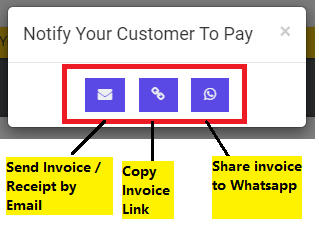
2. Provide easy payment options
Maybe one of the reasons your customers are delaying their payment is because of the time it takes to prepare cheques, perform cash withdrawals, or initiate payment transfer. These days everyone is so used to getting things done instantly through a few clicks that even the thought of having to log into their online banking app will delay their actions.
How Biztory solves this is to allow easy payment through iPay88 payment gateway at a click of a button. After sending the invoice to your customer, they are able to click on the ‘pay’ button to initiate payment. Not only does this ease your customers’ payment process, your records are automatically updated once payment is received!
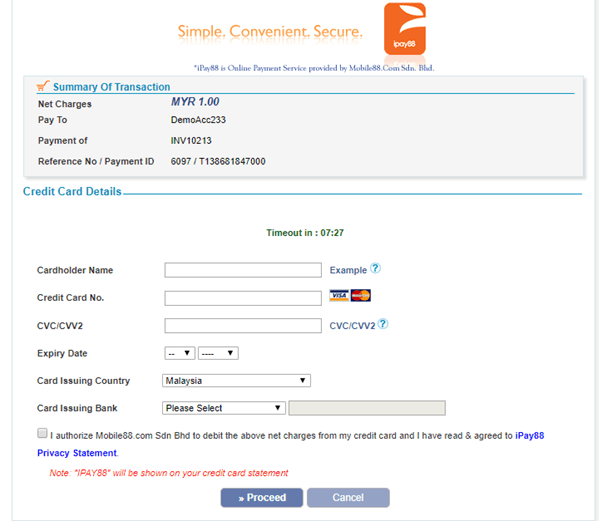
3. Give discounts for early payment, and apply interest on late payment
Everybody loves a good discount, so why not provide your customers with some to encourage them to pay their dues earlier? On the other hand, you may also apply an interest rate on any late payment to discourage your customers from making late payments. Nobody wants to pay more, but everybody would love to pay less.
Knowing that this is what some of our clients practice, the Biztory app is also well equipped to allow discounts to be applied on your invoices.
4. Send reminders before or after payment due date
Sometimes, as normal humans, we forget important dates and miss deadlines. This can also happen when you or your customers run each of your businesses, busy with day-to-day sales and operations. Therefore, it is helpful to send reminders if you want to be paid on time as this also prevents your customers from being charged an interest if they forget to pay on time.
With hundreds of transactions and invoices to track and manage, it would be great if reminders can be automatically sent out at scheduled dates instead of manually setting reminders and sending personal reminders in a manual way; and this is just what Biztory can offer you.
Via Biztory, you can send payment reminders before the due date, or after the due date, as long as you programme it according to your preference. The best thing is that the payment reminders will be automatically sent out when the date is right, so you can rest assured that your customers will be reminded when the time comes.

5. Perform invoice tracking and weekly reconciliation
While sending reminders is a good initiative to keep your customers reminded of a payment that is due, performing an invoice tracking and weekly reconciliation will allow you to check if the reminders are effective and your customers are not paying too late. By using Biztory, you will be able to generate a debtor’s aging report to get a general overview of what is owed by your debtors and their respective payment due dates.
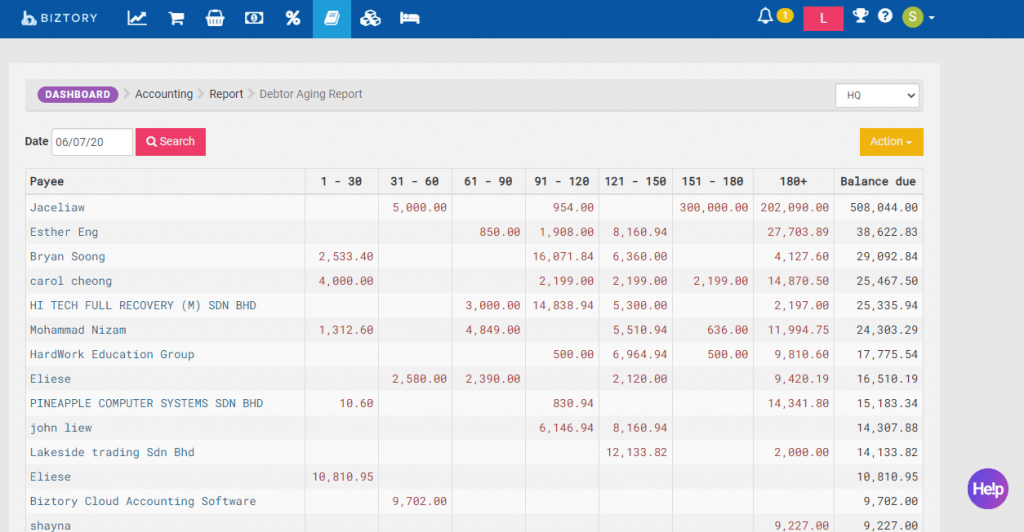
Biztory cloud accounting software
Now that you have learned the top 10 payment terms, 5 tips to getting paid faster, and the wonders Biztory can do for your business in the areas of invoicing, billing, payment and tracking, we invite you to explore the Biztory cloud accounting software for yourself and experience first-hand the holistic business solution that we present to you, try Biztory for 30 days free and we promise you will never look back!
